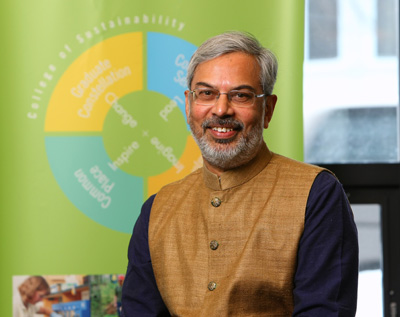 |
| Kartikeya Sarabhai at his Killam lecture (Nick Pearce photo) |
Leapfrogging: that’s what Kartikeya Sarabhai sees when he imagines a sustainable world.
As one of India’s foremost environmentalists, Mr. Sarabhai explained the term to a number of interested students and community members on Thursday night as part of the Killam Memorial Lecture Series.
When most people think about leapfrogging, images of a childhood game probably come to mind. But Mr. Sarabhai uses the term to describe how developing countries must bypass carbon-intensive industrialization and jump directly to sustainable development.
Twenty years ago, at the UN Conference on Environment and Development in Rio, Mr. Sarabhai was already concerned with developing nations following the example of the environmentally degrading Western industrialization process.
“The real challenge of development is not how to get there, but how not to,” he wrote in India’s Environment Report in 1992. Today, he believes that nations like India must avoid the mistakes of developed countries, including Canada, in their obsession with unsustainable levels of consumerism.
If every citizen in the world consumed as much as the average North American, Mr. Sarabhai said that by 2050 we would require four globes to meet that resource demand. He believes that this is not acceptable.
As the director of India’s Center for Environment Education, Mr.Sarabhai also spoke to the importance of formal education in making the transition to sustainable development.
In India, though education has traditionally been free, only in recent years has attendance become compulsory. This new policy is helping to ensure that future generations have the capacity to make environmentally-sound choices.
Students’ work in India is very hands-on, action oriented and community based. For example, Sarabhai highlighted one school campaign to repair leaking water taps, and another to build compost pits for small Indian villages.
He also discussed an upcoming environmental monitoring program that will allow citizens all over India to report unacceptable environmental practices on their cell phones. This innovative idea really caught the attention of the crowd, many of which were students associated with Dalhousie’s College of Sustainability.
Mr. Sarabhai ended his lecture on a positive note, describing how education will help draw attention to the issue of climate change and engage young people in the battle to prevent it.
“There’s not only hope for the future, there’s a lot we can do. We need to use all the tools we have to change the world.”
Mr. Sarabhai’s lecture was the first of two being presented in memory of Izaak and Dorothy Killam, philanthropists who left a sizeable trust to various educational institutions across the country. The final lecture will be presented by William Rees, co-creator of the ecological footprint, on Thursday, March 17 at 7 p.m. in Ondaatje Hall.
Comments
comments powered by Disqus
